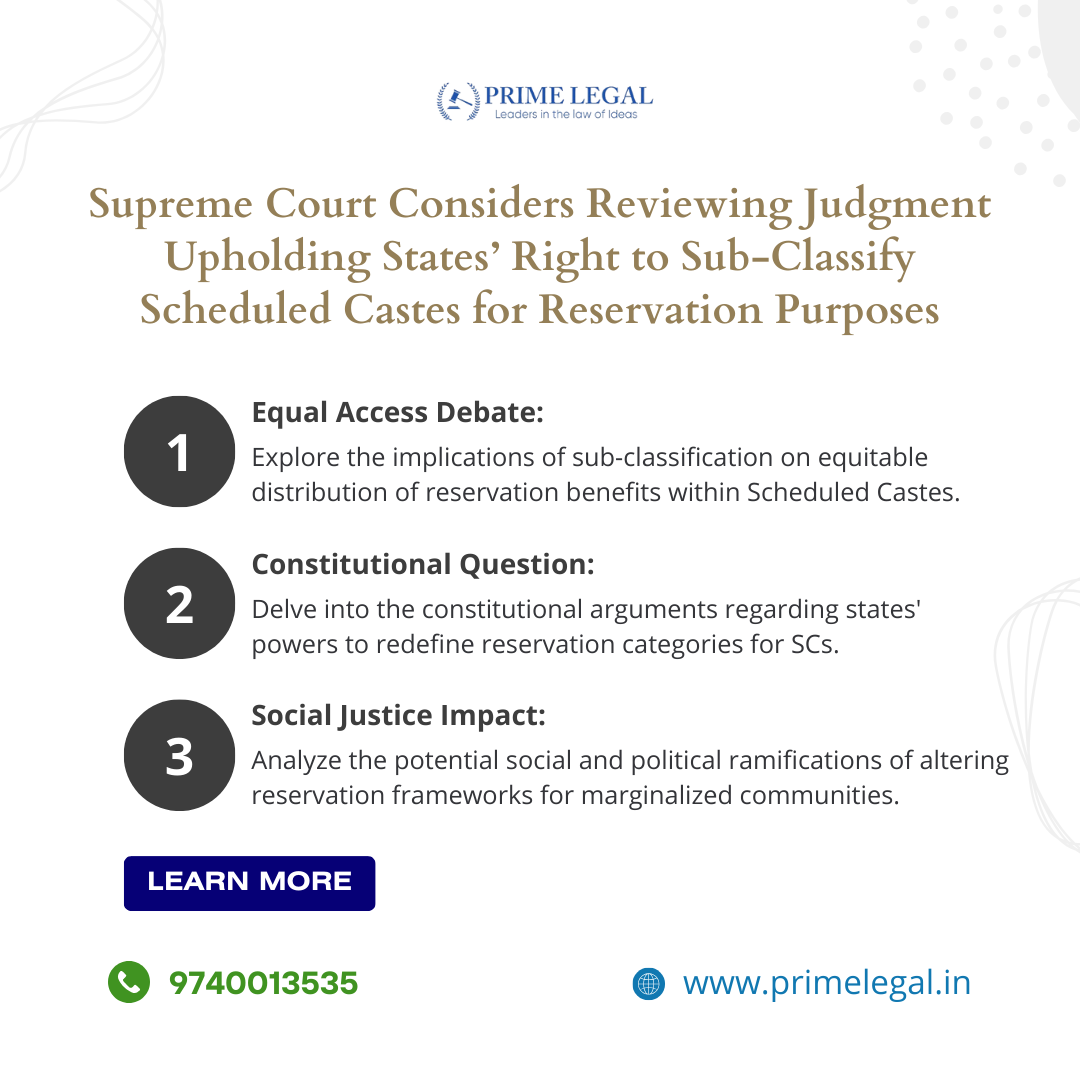INTRODUCTION
In a landmark judgement, a seven-judge Bench of the Supreme Court on August 1 reframed how the Scheduled Castes (SC) and Scheduled Tribes (ST) quota may operate — for the very first time since reservations were introduced in the Constitution in 1950.
BACKGROUND
The Bench headed by Chief Justice of India D Y Chandrachud permitted states to create sub-classifications within the SC and ST categories for the purpose of according wider protections — through fixed sub-quotas — to the most backward communities within these categories.
The seven judge bench of the Supreme Court in has recently held that sub-classification of the Scheduled Caste (SC) and Scheduled Tribe (ST) categories is permissible under Article 14, 15(4) and 16(4) of the Constitution of India.
In a 6:1 ruling, the Bench headed by Chief Justice of India D Y Chandrachud permitted states to create sub-classifications within the SC and ST categories for the purpose of according wider protections — through fixed sub-quotas — to the most backward communities within these categories.
This observation was made in the case of State of Punjab & Ors. vs Davinder Singh & Ors. SC 538 .
LEGAL ASPECTS
- The Court ruled that states are constitutionally allowed to sub-classify SCs and STs based on varying levels of backwardness.
- The court has held that sub-classification for the purposes of reservation is a facet and exposition of ‘substantive equality’ as against mere ‘formal equality’.
- While doing so, the court has now overruled its judgment in EV Chinnaiah vs. State of Andhra Pradesh (2005) 1 SCC 394 wherein it had held that SC’s and ST’s form a homogenous class for the purposes of Article 15(4) and 16(4) and therefore no further sub-classification within these categories could be permitted.
- The court, while permitting sub-classification, was moved by two ground realities:
- The inclusion of castes, groups, communities or tribes in the list of SCs and STs, specified in Article 341 and 342 respectively, does not automatically lead to the formation of a uniform and internally homogenous class which cannot be further classified. The inclusion of a caste in the list of SCs and STs cannot be stretched to draw inferences about the existence or non-existence of internal differences among them.
- The absence of sub-classification has ensured that only a few dominant castes in the reserved categories avail the benefit of reservation. The rest of the castes from these categories continue to be underrepresented or worse, not represented at all.
- The seven-judge Bench ruled that states can now sub-classify SCs within the 15% reservation quota to provide better support for the most disadvantaged groups.
- Chief Justice of India emphasised the difference between “sub-classification” and “sub-categorisation,” cautioning against using these classifications for political appeasement rather than genuine upliftment.
- The Court clarified that 100% reservation for any sub-class is not permissible. State decisions on sub-classification are subject to judicial review to prevent political misuse.
- The Supreme Court has ruled that the ‘creamy layer’ principle, previously applied only to Other Backward Classes (OBCs) (as highlighted in Indra Sawhney Case), should now also be applied to SCs and STs.
- The court stated that Reservation has to be limited only to the first generation.
CONCLUSION
The Indian Constitution adopted a very liberal and forward looking approach to granting reservations. In Davinder Singh Justice Chandrachud suggested a novel approach of assessing candidates from reserved categories based on diverse skill sets, rather than focussing solely on marks.
“PRIME LEGAL is a full-service law firm that has won a National Award and has more than 20 years of experience in an array of sectors and practice areas. Prime legal falls into the category of best law firm, best lawyer, best family lawyer, best divorce lawyer, best divorce law firm, best criminal lawyer, best criminal law firm, best consumer lawyer, best civil lawyer.”
WRITTEN BY: PRATIKSHA SWAIN


